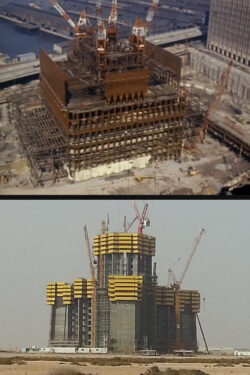As a final session of our fall semester, Museum Director Carol Willis offers an overview of the themes explored in the series and proposes a set of characteristics to define “skyscraper” that includes 21st-century developments. She argues that looking backward from today makes clear that a standard definition that cites “steel skeleton” is woefully outdated and proposes some key characteristics that have defined the skyscraper typology across the past 150 years.
The standard narrative of the birth and development of the skyscraper has always stressed steel replacing masonry. But today, concrete is employed in a range of structural systems and a heavy concrete core is the standard feature of all supertalls. The engineer of the next world’s tallest building (if completed) Jeddah Tower, describes its structure a “pure bearing wall.”
A better definition of the skyscraper and its history uses more lenses than a focus on materials, technology, and structural systems, as our series of speakers have demonstrated in their talks. But there is a fixation on certain questions in the popular press and even in scholarship such as the recent publication of the Council on Tall Buildings and Urban Habitat (CTBUH) titled First Skyscrapers | Skyscraper Firsts.
“What was the first skyscraper?” presupposes we know what a “skyscraper” is. Willis will attempt to frame some of the points of a definition and discussion for a continuing dialogue.
Readings
Carol Willis, “Fractious Firsts,” in First Skyscrapers | Skyscraper Firsts, CTBUH, Chicago, 2020.
Carol Willis
Carol Willis is the founder and director of the Skyscraper Museum and a professor of Urban Studies at Columbia University’s Graduate School of Architecture, Preservation and Planning. She is also the author of Form Follows Finance and co-author of Building the Empire State with Donald Friedman.
